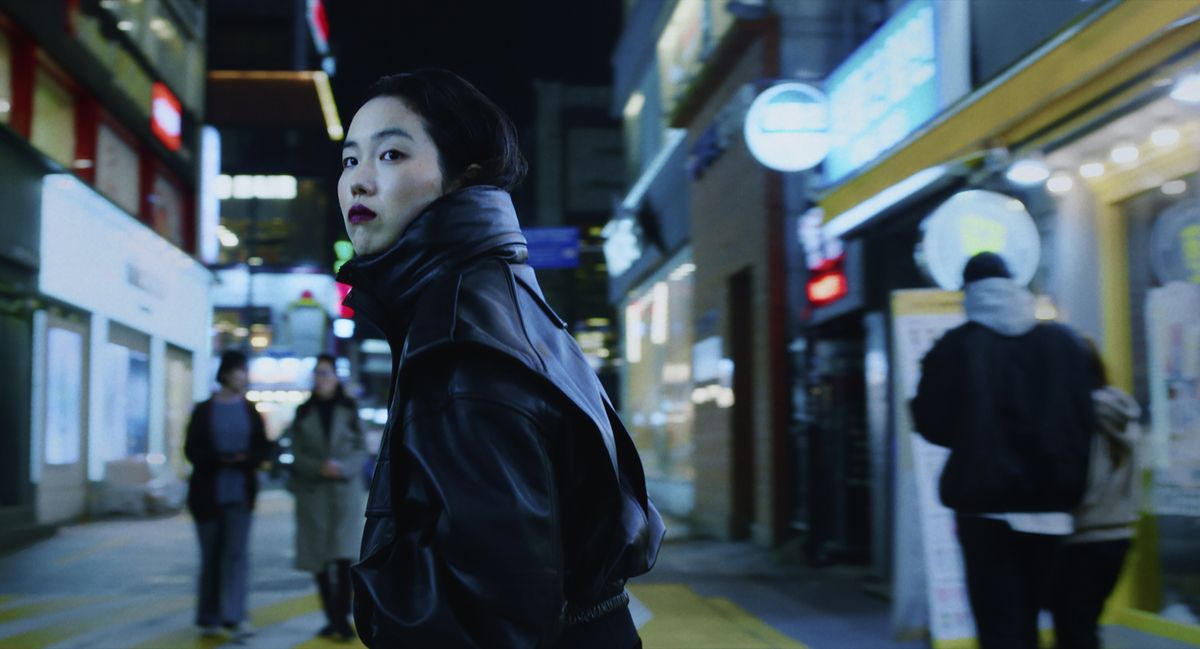Movie Review: Newcomer Park finds her rhythm in ‘Return to Seoul’

In one of the first scenes of “Return to Seoul,” the striking second film by French Cambodian filmmaker Davy Chou, and Cambodia’s 2022 Oscar entry, Freddie (Ji-min Park), a French woman who has just landed in Seoul, gets to know her new Korean friends over shots of soju. As she boldly pours her own drink (frowned upon in Korean etiquette) she casually tells them about her approach to life, which she describes as “sight reading,” as in music – learning the signs, how to read them and then plunging into the unknown. Little does she know how much sight reading she will do over the course of an eight-year personal odyssey of self-discovery, on a restless search for identity.
In the restaurant, inspired, Freddie rallies several disparate groups of young people, bringing them together with her easy swagger. Freddie is bold, daring, possessed of a mischievous smirk and that certain cool French je ne sais quoi. Adopted from Korea as a baby, she looks like everyone else, but she doesn’t act Korean, rebuffing formalities and expected behavior. She’s forthright to the point of being aggressive; she dances and moves and drinks and speaks with abandon, not caring what other people think, or if they are hurt by her almost brutal sense of independence.
Freddie landed in Korea impulsively – there were no flights to Japan due to a typhoon – but when she’s there she decides to look up her biological parents, eventually meeting her father (Oh Kwang-rok) and his family. But as a wild and sullen 20-something, she is unreceptive to their sorrow, grief and regret. Their trauma is not the same, and as a strident French woman, she is unwilling to be the kind of dutiful Korean daughter she may have been in another life.
Skip ahead two years and Freddie is still in Seoul, working as a consultant, distracting herself with booze, drugs and men. She is sleek, clad in black leather and dark lipstick, and even more elusive, mercurial and self-destructive. This is an evolution from the Freddie we first meet, but though she seems like she’s on the up and up, there’s a darkness and chaos in her life, the harbinger of a downward spiral.
We meet another version of Freddie, five years later, a wellness and meditation-obsessed girlboss selling missiles for “national defense,” though her carefully calibrated stability can shatter in a second. Another year after that and she’s transformed again, seemingly back to square one, but perhaps with the knowledge that all the searching, yearning and evolving she’s done has led her back to herself, back to the practice of sight reading, stumbling through the notes, not getting it right the first time but eventually finding her rhythm.
Chou’s direction is patient yet energetic, sometimes elliptical and willing to take a beat, reflecting the inner tempo of our protagonist as she traverses – and eventually inhabits – the world of Seoul, rendered here with saturated color and texture. The cinematography by Thomas Favel is rich and evocative of Freddie’s emotional experience, from a cold seaside trip to her father’s hometown, to the shiny, neon-soaked landscape of Seoul at night.
Chou’s film is driven by music, and “Return to Seoul” boasts one the best soundtracks of the year. Composers Jeremie Arcache and Christophe Musset mark the beats of Freddie’s journey with a skittering indie sleaze score of guitars, drums, strings and keys that are as agitated as Freddie herself, as well as new wave-inspired dance tracks and Elliot Smith-style acoustic ballads. A beat will kick in underneath a sly smile of Freddie’s as the wheels turn in her head. She dances alone in a bar to a pop funk song in one of her iterations, and then to a heavy techno track in her underground rave era. Her father, in one of his many vulnerable moments, shares a plaintive tune he’s composed, in one of his final attempts to breach her emotional walls.
Park, who is a visual artist, and has never acted before, is nothing less than a magnetic force onscreen. You can’t take your eyes off her, and she appears in nearly every frame, embodying every evolution of this character. Freddie is often placid with bursts of unpredictable energy – one never knows what she’s going to do or say, and neither do the people around her, much to their chagrin. But neither does Freddie, she’s just sight reading after all. After a painful, tumultuous and often harrowing journey, she ultimately finds a way to return to herself, to her own soul.